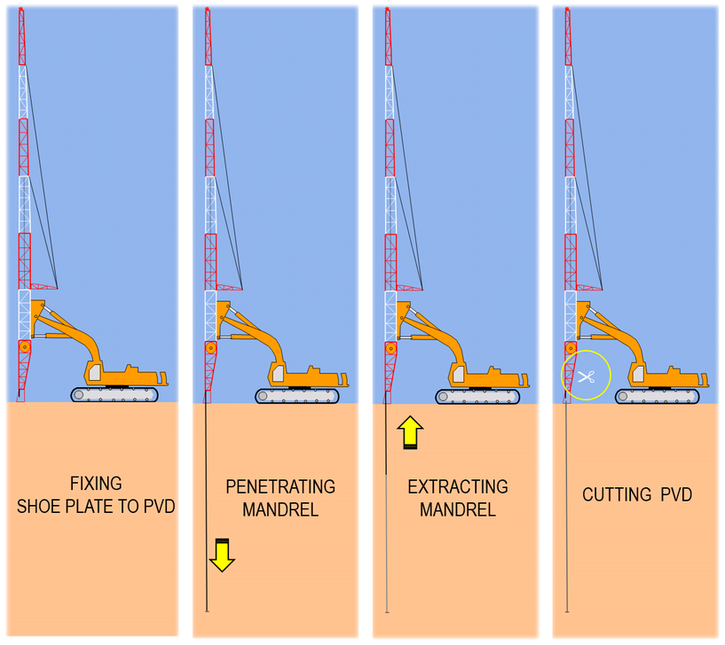
ARCHICRAFT DESIGN SDN. BHD.




When it comes to managing soil consolidation and improving drainage in construction projects, two common solutions are Prefabricated Vertical Drains (PVDs) and Sand Drains. Both methods are essential for ensuring the stability and longevity of structures, whether you're working on house design, office interior design, architecture design, or renovation projects. Here's a detailed comparison of these two drainage systems and their relevance to various design and construction scenarios.
PVDs are artificial drainage channels made of geosynthetic materials, typically consisting of a plastic core wrapped in a geotextile filter. These drains are installed vertically into soft soils to expedite water drainage and soil consolidation. The geotextile layer allows water to pass through while preventing soil particles from clogging the system.
Watch this video to see how Prefabricated Vertical Drains (PVDs) function effectively in accelerating soil consolidation.


Faster Installation: PVDs are installed using a mandrel-driven installation process, making them quicker to deploy compared to sand drains.
Cost-Effective: The use of lightweight materials and easy installation reduces labor and material costs.
Environmentally Friendly: Minimal soil disturbance and reduced material extraction make PVDs more sustainable.
Efficient Drainage: PVDs provide a direct path for water to escape, speeding up the consolidation process.
Less Soil Displacement: Unlike sand drains, PVDs do not require excavation, reducing soil movement and settlement issues.
Susceptible to Clogging: Fine-grained soils can clog the geotextile filter over time, reducing effectiveness.
Depth Limitation: While effective for moderate depths, extremely deep applications may require alternative solutions.

Sand drains are vertical columns of granular material (typically sand) installed in soft soil to enhance drainage. These drains are created by drilling or driving a casing into the ground, filling it with sand, and removing the casing. The sand provides a permeable pathway for water to escape, accelerating consolidation.

Good Long-Term Performance: Sand drains provide a permanent drainage path that is less prone to clogging compared to PVDs.
Higher Permeability: Sand’s natural permeability allows rapid drainage, particularly in well-graded sandy soils.
Effective in Deep Applications: Sand drains can be installed deeper than PVDs, making them suitable for thick clay deposits.
Higher Cost: Material and installation costs are higher due to excavation, transport, and sand requirements.
Time-Consuming Installation: Drilling or driving the casing takes longer compared to the mandrel-driven PVD installation.
Environmental Concerns: Sand extraction impacts natural resources, and soil displacement can affect surrounding structures.
Soil Settlement Issues: Excessive soil displacement may cause uneven settlements in some cases.

Summary of comparison between Prefabricated Vertical Drains (PVDs) and Sand Drains as below:

Both PVDs and sand drains are effective in accelerating soil consolidation, but PVDs generally offer a more cost-effective, environmentally friendly, and faster installation method. They are particularly advantageous in moderate-depth applications with fine-grained soils. However, for deep deposits and highly permeable soils, sand drains may be preferable due to their long-term drainage performance and reduced clogging risks.
The choice ultimately depends on project-specific conditions, geotechnical requirements, and budget constraints. A thorough site analysis should guide the selection process to ensure optimal soil improvement and project success.
With extensive experience in Interior Design & Renovation across Malaysia and Singapore, we bring exceptional expertise to every project. Our proven track record speaks for itself—delivering stunning and functional spaces without compromising on quality.
Trust us to transform your vision into reality with precision and excellence. For inquiries about our services, feel free to contact us at +6011-5755 0549.
Stay inspired by the latest design trends and explore our past and latest projects by following us on Facebook, Instagram, Titok and Xiaohongshu - where creativity meets exceptional interior design, renovation, house design, architecture design, and office interior design!



